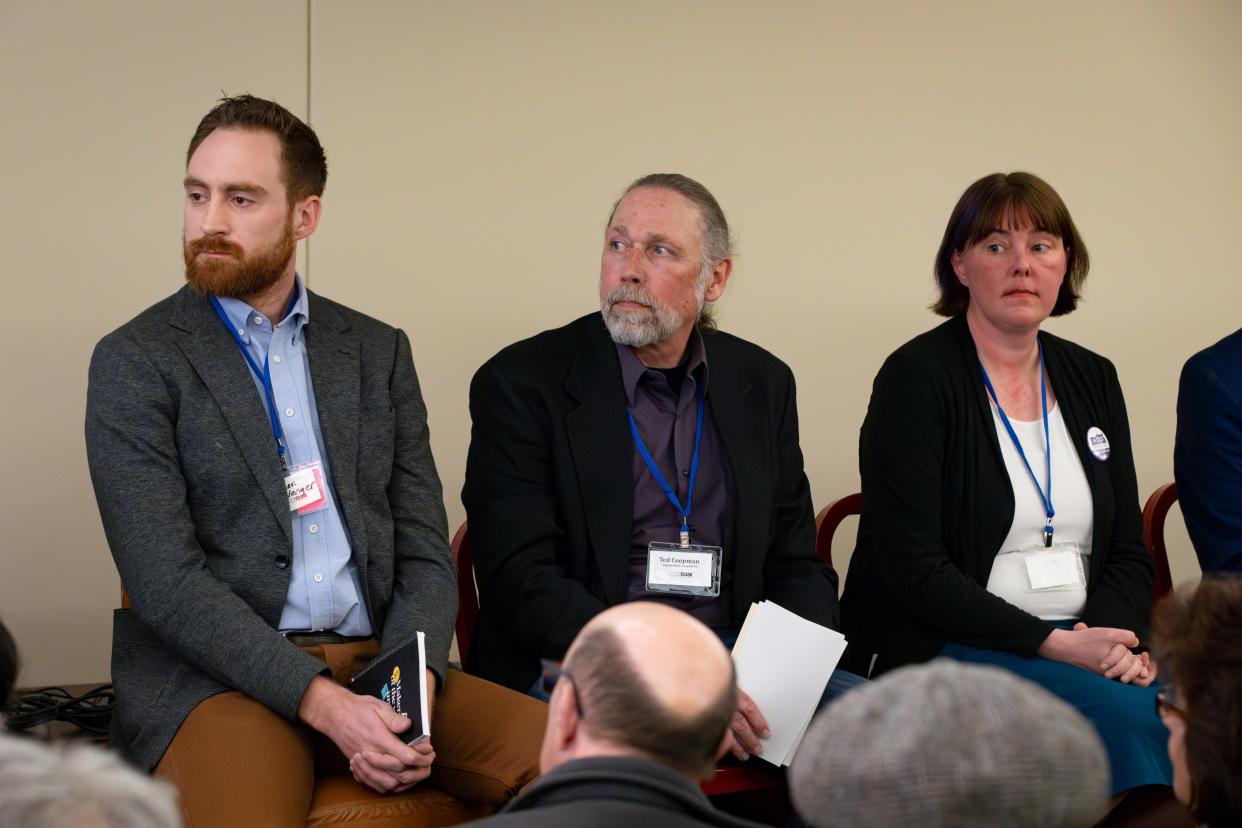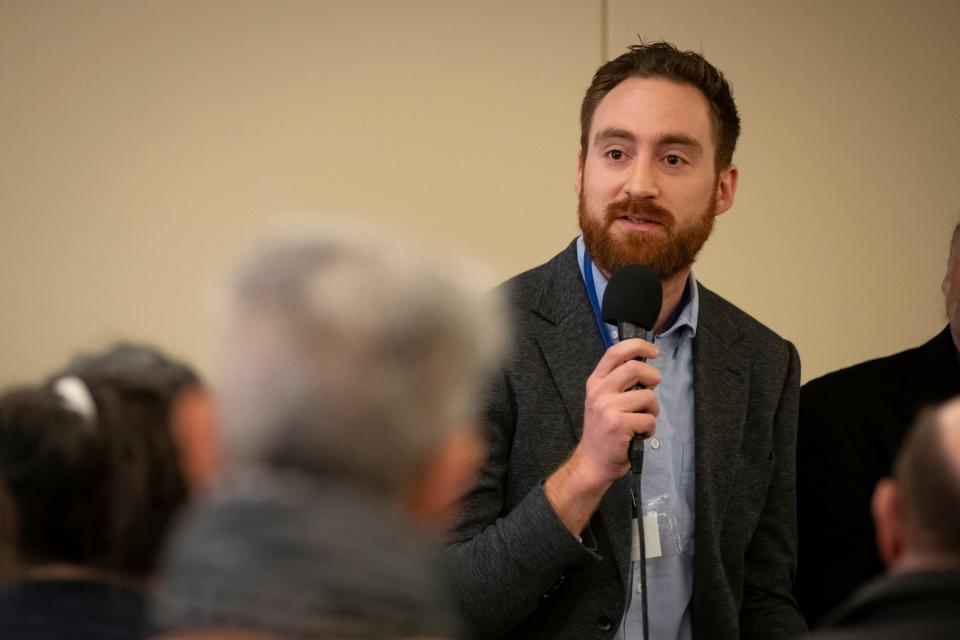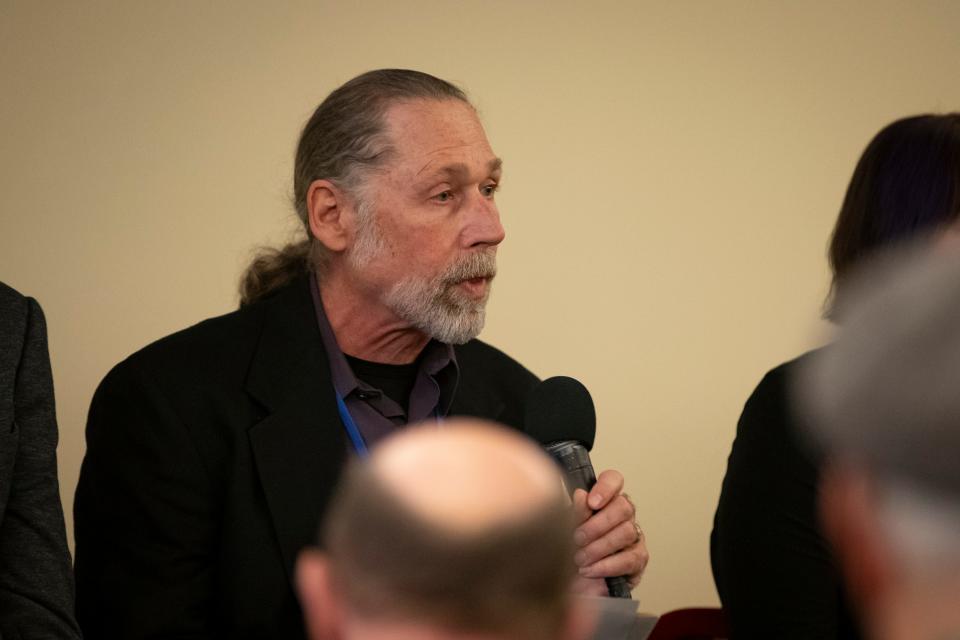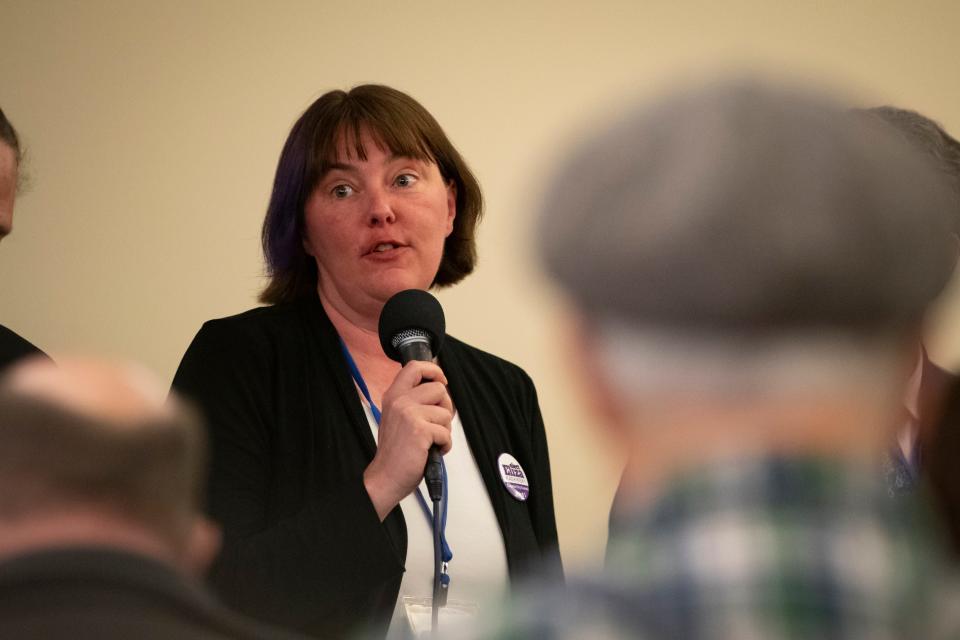Where these Eugene City Council candidates stand on housing, homelessness, budget, other topics

Update: On April 11, Kashinsky clarified that she was in opposition to the pickleball court at Striker Field, not the one at Lane Community College.
The three candidates running to represent Ward 1 fielded questions Friday from KLCC reporter Rachael McDonald at a City Club-hosted forum, addressing topics such ashousing costs and homelessness, the city's budget, and the proposed Eugene Emeralds' stadium.
City Council Ward 1 approximately includes the Far West, Friendly and Jefferson Westside neighborhoods, as well as downtown south of 7th Avenue and west of High Street.
Emily Semple has represented the ward since 2017 and is not seeking a third term. Three Ward 1 residents are running to replace her. Tuesday, April 30, is the last day to register to vote, and the Lane County elections office is expected to mail ballots starting around Thursday, May 2. Ballots are due Tuesday, May 21.
Eugene city councilor is a nonpartisan office, meaning the primary will appear on the ballots of all voters in the ward regardless of party. If a candidate earns a majority of the vote, they will run uncontested in November. If no candidate earns a majority, the two with the most votes will run head-to-head in November.
Opening, closing statements from Eugene City Council candidates
During the three candidates' opening and closing statements, they spent most of their time highlighting their unique experiences and endorsements.
Ethan Clevenger is a downtown small business owner and president of the business advocacy group Downtown Eugene Merchants. Clevenger said this experience has made him invested in finding solutions. He highlighted endorsements from both the Democratic Party of Lane County and the Eugene Chamber of Commerce. (DPLC endorsed both Clevenger and Eliza Kashinsky)
"People in both of those rooms recognize that if we're going to move the needle on housing and homelessness. If we're going to make our public spaces and our downtown streets more convenient and accessible for our entire community. We're going to have to evaluate all ideas in our community in good faith and with an open mind," he said.
Ted Coopman is chair of the Jefferson Westside neighborhood association where he said he helped accomplish projects such as the Ollie Court affordable housing complex. Coopman highlighted his endorsements which include four of the eight current city councilors and many neighborhood association leaders. Of the three candidates he was most critical of current leadership.
"I'm tired of watching my neighbors suffer over poorly thought out policies and the neglect of Ward 1 neighborhoods," Coopman said. "If you think we need leadership for a change, then vote for me in May, … I'm an independent Democrat who takes direction from Ward 1 voters, not political parties or powerful special interests."
Eliza Kashinsky has served on advisory committees for Eugene's budget and walkability and Lane County planning, where she said she's improved Eugene's walkability and housing diversity. She's been endorsed by Eugene Mayor Lucy Vinis, the four city councilors who didn't endorse Coopman and several of her colleagues on the budget and planning committees. She made the case that of the candidates, her experience was most relevant.
"Climate, our housing shortage, the homelessness crisis … these are problems that need hard work," Kashinsky said. "I've been doing this work for 10 years as an advocate, for 7 years on the budget committee, and I've gained those relationships I've gained that knowledge. I've done this before."
Senior and disability access

In response to the AARP-sponsored question of the forum on how candidates will address "the needs of older adults and people with disabilities, while also engaging older adults," Coopman and Kashinsky highlighted physical aspects of the city's accessibility they wanted to improve, while Clevenger focused on ideas to improve the financial situation of seniors.
Coopman said he wanted to fix the physical accessibility of the city's sidewalks. "I know that there are a lot of my neighbors who are elderly or mobility challenged or just regular people that have hurt themselves on the sidewalks," he said. Coopman said building and repairing these sidewalks, "will do a lot towards allowing people as we age … to get around."
Kashinsky said she wanted to rethink Eugene's urban planning to be more walkable, and that reducing residents' reliance on cars will make the city more accessible. "In Ward 1 we're incredibly fortunate that we can have the conversation about sidewalks," she said. "But there are lots of places in the city where there aren't even sidewalks, and even if there were sidewalks you'd be walking … more than a mile to get to anything other than a house."
Clevenger highlighted the financial hardships of seniors and shared ideas for the city to help with that. He said that by improving housing diversity and expanding the city's home repair program, it would be more affordable for seniors to afford housing. He also said that by encouraging economic development, the city could make it so residents have more money to retire with.
Budget
When asked how they would address the city's budget shortfall, Kashinsky and Clevenger both said they would look for projects that were "nice" but not needed, as things to cut. Coopman said he would look to cut administrative costs.
Kashinsky, who's served on Eugene's budget committee, said she would focus on maintaining "essential needs" while cutting things that are "nice to have." Kashinsky said she would prioritize maintaining programs "that if we lose them, it's going to hurt our city and have long-term impacts" and pointed to the proposed LCC the pickleball court at Striker Park facility as an example of something "nice to have" that she would be willing to cut.
Clevenger seconded Kashinsky's stance that the city should reject "nice to have" projects like the pickleball facility, "You have to decide is that a nice-to-have thing or is that a must-have thing?" He also said he wanted to raise revenue by appealing to other elected officials. "If we can improve our relationship with county and state officials, we can ensure that when the governor's budget comes out each year we have more monies for our community."
Coopman said the city could earn revenue by encouraging economic development and shrink costs by hiring an independent auditor and cutting costs from city administration. "If we have to cut we should cut from the top," he said. "We are bringing on a third assistant city manager. They are near the highest-paid people in our city government and I'm unclear as to why we need to do that."
Emeralds stadium

When asked for their opinion on the proposed Emeralds stadium and multi-use Lane County fairgrounds facility, Clevenger and Coopman both expressed support for the project while Kashinsky shared concerns, but all three said they agreed with the city council's decision to send it to voters.
Clevenger described the Emeralds as a community asset and said he agreed with the move to send the bond measure to the ballot. "I think we'd be having a different conversation if we were talking about a very exclusive thing for people to do in our community, but the reality is this is a $15 ticket for families who more and more feel like Eugene is not serving them," he said.
Coopman also voiced support for the project and the decision to send voters the bond measure. He said he'd been working with the Emeralds as Jefferson Westside neighborhood chair, and that he supported the project for its economic impact. "I think it pencils out. It's a very good economic boon for us and I'm a supporter of it," he said.
Kashinsky shared skepticism of the project but said she still agreed with letting voters decide. "We don't know where the rest of the money is coming from. We don't know what the impact is and what the operational pieces are going to be, and so that makes me a little bit nervous," Kashinsky said. But she also said she agreed with councilors sending the bond to the ballot. "That will allow us to kind of get a sense of where people are with this," she said.
Community engagement
When asked how the candidates would seek community input for decision-making, Clevenger and Kashinsky said they would go out to people to seek their input, while Coopman said city leaders could better utilize neighborhood associations for feedback.
"We have to go out and meet with constituents," Clevenger said. "We have to go out and find the young families and find folks in minority communities like the LGBTQ+ community, and engage with them authentically," he said, and that directly listening to people this way would let councilors create the best plans.
Coopman said the city should better use neighborhood associations. "If you really want to reach neighbors, they should be reached by other neighbors, … Physicality matters." Coopman criticized current city leadership, which he said was undercutting and underfunding neighborhood associations. "Before I came (to the Jefferson Westside neighborhood association) there were three staff people that were dedicated full-time. Now we're down to one."
Kashinsky also said she would seek feedback from people directly. "The type of people who can spend their Tuesday night at a neighborhood association meeting or Monday night commenting at city council are not necessarily representative of the city," she said. "You have to be able to go to them to figure out what they need."
Housing affordability

When asked how they would improve housing affordability, Clevenger and Kashinsky both said they wanted to increase housing supply with deregulation, with Clevenger emphasizing construction rules while Kashinsky focused more on land use. Coopman instead called for an expansion of housing to currently undeveloped parts of Eugene's urban growth boundary.
Clevenger said to improve housing affordability he would reduce the red tape that he said currently gets in the way of development. Clevenger said carpenters have told him Eugene rules are difficult to work with. "Sometimes it's about red tape. Sometimes it's about jumping through hoops. And that is why folks don't work on development projects in Eugene sometimes," he said.
Coopman said to improve housing affordability he would work to expand infrastructure to the parts of the urban growth boundary that don't already have it. "The only way you're going to drop the price of homes is the same way that we made housing affordable after the Second World War, and that's at massive scale," he said. He criticized current leadership, which he said is overly focused on infill instead of affordable housing.
Kashinsky said the main reason housing is expensive is exclusionary zoning and that she's been working to combat this, and that to further improve housing access, she would look for more barriers in the city's rules. "What are the other things that are in our codes and our practices that make it hard for people to create homes in Eugene?" she said.
Homelessness
When asked for their strategies to address homelessness, Coopman called for state and county-funded sanctioned camping, Kashinsky said the city should do more to support housing and shelter development, and Clevenger added a desire to increase mental health resources.
Coopman said he would use the city council platform to push for sanctioned camping paid for by the state and county. "It is the county and the state's fiscal, statutory responsibility to provide housing for the unhoused, for mental health, and for physical health and they have fallen down tragically," he said. "Sanctioned camping is the answer. It is the only answer, and that should be coupled with removing the possibility for street camping."
Kashinsky said she disagreed with the idea homelessness isn't the city's problem. "Passing the buck on whose problem homelessness is is not going to solve it," she said. Kashinsky said that working with the state and city is part of the answer, but also that the city should work more to create more housing and provide more shelter while assessing how people become homeless and working to combat that.
Clevenger said he agreed with both, saying the city should keep funding its Safe Sleep Sites while pushing the state and county to fund a share of those sites. He also said the state could reduce homelessness by increasing access to mental health resources. "We need to be partnering with folks at the state to make sure that this is an attractive place for people who work in that industry to come here and set up shop," he said.
To listen to the full forum featuring the Ward 1 and Ward 2 Eugene City Council candidates, visit https://www.klcc.org/show/city-club-of-eugene/2024-04-01/city-club-of-eugene
Alan Torres covers local government for the Register-Guard. He can be reached over email at atorres@registerguard.com or on X @alanfryetorres.
This article originally appeared on Register-Guard: How Eugene City Council Ward 1 candidates stand housing, budget, Ems

